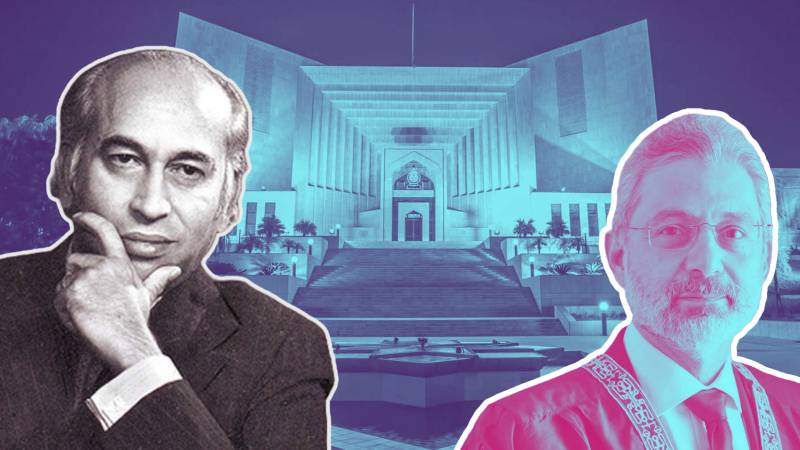
The Supreme Court of Pakistan on Wednesday, in a landmark judgement, held that former prime minister Zulfikar Ali Bhutto did not get a fair trial nor did it meet provisions of due process - as a consequence of which he was executed.
A three-member bench, led by Chief Justice of Pakistan Qazi Faez Isa, announced a short order.
"The proceedings of the trial by the Lahore High Court and of the appeal by the Supreme Court of Pakistan do not meet the requirements of the fundamental right to a fair trial and due process enshrined in Articles 4 and 9 of the Constitution and later guaranteed as a separate and independent fundamental right under Article 10-A of the Constitution," the court opined, noting that while Article 10-A did not explicitly exist when Zulfikar Ali Bhutto was tried, but the principles enunciated therein have always been a part of jurisprudence.
"The Constitution and the law do not provide a mechanism to set aside the judgment whereby Mr Bhutto was convicted and sentenced. The said judgement attained finality after the dismissal of the review petition by this court," CJP Isa said.
The second question the court answered was: whereby conviction leading to the execution of Shaheed Zulfikar Ali Bhutto can be termed as a decision of the Supreme Court binding on all courts being based upon or enunciating the principle of law in terms of Article 189 of the Constitution of the Islamic Republic of Pakistan if not its effective consequences.
The court gave its opinion that "the reference questions do not specify the principle of law enunciated by this court in the Zulfikar Ali Bhutto case regarding which our opinion is sought. Therefore it cannot be answered whether any principle of law enunciated by this court in the Zulfikar Ali Bhutto case has been dissented to or overruled."
Questions 3 and 5 were answered together. They are:
3. Whether, in the peculiar circumstances of this case, awarding and maintaining the death sentence was justified, or it could amount to deliberate murder, keeping in view the glaring bias against Shaeed Zulfikar Ali Bhutto?
5. Whether on the basis of conclusions arrived at and inferences drawn from the evidence material in the case in order for conviction and sentence against Shaheed Zulfikar Ali Bhutto could have been recorded.
Opinion: In its advisory jurisdiction under Article 186 of the Constitution, this court cannot pre-appraise the evidence and undo the decision of the case. However, in our detailed reasons, we will identify the major constitutional and legal lapses that have occurred with regard to fair trial and due process. We did not find that the fair trial or due process requirements were met, which is what we have really focussed on.
Question 4 referred to Islamic injunctions: "our opinion is we kept repeatedly asking that we needed assistance, but it was not rendered, so our opinion is that we were not rendered any assistance on this question; therefore, it will be inappropriate to render an opinion on the Islamic aspects."
"Our opinion is that the late Mr Zulfikar Ali Bhutto did not get a fair trial, and it was not in accordance with the constitutional requirement of due process."
Verdict will help restore confidence in judiciary
Later, while speaking to the media outside the court, Pakistan Peoples Party (PPP) Chairman Bilawal Bhutto Zardari termed the verdict historic.
Bilawal, who is the grandson of Zulfikar Ali Bhutto and has succeeded him as the head of the PPP, said that the court has accepted that Zulfikar Ali Bhutto did not get the opportunity for a fair trial.
He added that the court had given the verdict to correct past mistakes. He added that the people of Pakistan had pinned their hopes on this case that the court would finally do justice, and now that the verdict has come, they can hope to attain justice in the courts.
Bilawal hoped that the verdict would allow Pakistan to progress and for the system to move in the right direction.
The PPP chairman said they would consult with their lawyers when a detailed written judgement was released.
PM Shehbaz Sharif, in a message, said that while it is not possible to correct a historical mistake, admitting a serious mistake creates new history and new traditions.
He termed the court's decision to admit past abuse and correct it as a positive step.
Shehbaz hoped the unanimous opinion of the top court in the Bhutto reference would help understand history in the correct context at the national level.
The process of national unity and development can be accelerated only by correcting past mistakes and eliminating bitterness.

